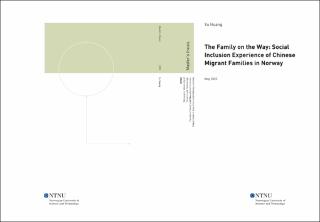| dc.description.abstract | This study attempts to explore the social inclusion experience of Chinese migrant parents and children in Norway, with a focus on the intergenerational relationship as the main key aspect. It also enhances understanding between two diverse cultures and societies, China and Norway. This study uses theories from migration research and psychology to guide the analysis and to associate with the methodology, together with concepts of children’s agency, and generational order from childhood studies.
A total of six families (eight children and nine parents) participated in the study and the children ranged from eight to eighteen years. This study uses qualitative research methods including neighbourhood walk and household visits, drawing, and semi-structured interviews to explore the understanding of participants’ social inclusion experience. More specifically, this study seeks to find out the new challenges in the migrant parents and children’s everyday lives, such as language barriers, climate differences, food habits and traditional festivals, education experiences of migrant children and working experiences of migrant parents, friendship, and network; their coping strategies when they faced with the challenges; the relationship between parents and children and how migration impact on their relationship.
The research findings indicate that family migration faces new challenges in the destination country, but it also severely impacts intergenerational relationships. It also includes the unique situation of Norwegian-born children of Chinese immigrants or Chinese-born children who faced challenges and lack of contact with local culture and community, which I describe as the "Chinese island in Norway". The results in this Master project reveal evidence of intergenerational transmission of emotional closeness, conflict and ambivalence. However, it also identifies the significant changes in parenting styles that have taken place in migrant family life and new perceptions of the traditional notion of filial expectation regarding intergenerational relationships in China from children’s perspectives. | |
